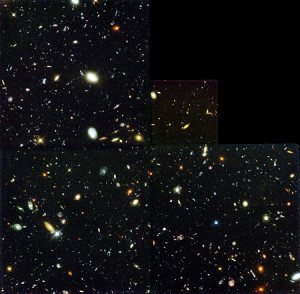It’s a slight argument, one that might seem not to amount to much, plus quite abstract. But I have a feeling that inside it, trying to get out, is something quite extraordinary.
One. The universe of things is contingent–it may or may not be. All the evidence points against anything eternal in it. Another, empirical, way of saying the same thing is that the energy of the universe is finite and so, ultimately, it will be reduced to entropy and dust. (To posit a multi-verse is to create a regression; that too must eventually end in exhaustion.) If this is the universe’s nature and destiny we have no explanation or reason for its existence in the first place.
Two. On the other hand, if we cannot explain the universe and nevertheless it is, its factual being provides an example of something we cannot explain and yet is. As far as we are concerned, therefore, it is equally possible that there is an eternal living creator whose existence we cannot explain. (Note that this is not an argument for a god as first cause of the world, but of the possibility of such a being.)
In other words, all things are equally im/possible (possible not to be) and possible–as far as we are concerned!
Three. At the same, this kind of philosophical discussion about the possibility of a divine creator has little or no bearing on the traditional anthropological function of a god. According to Rene’ Girard the origin of the god is nothing to do with abstract possibilities, it is rather the sacred vessel of the group’s violence, the ur-symbol of primitive human order. The philosophical questions about the existence of God are in many ways a result of the loss of trust in these primitive mechanisms under the influence of the gospels (Girard’s argument of cultural influence).
Girard allows us, therefore, to approach these traditional questions in a new way. Letting go of violence at the source of human meaning allows us to fill the universe with a new possible meaning.
Four. Jesus is the paradigm for human being who rendered the possibility of the creator into the possibility of love. He took the ancient signifier “god” and filled it with love. He said, “Yes, there is a Creator God. He is my Father, a God of Love.”
Through his teaching, life, death and resurrection he translated the figure of God into love. He anchors the universe in love. The testimony of Jesus’ resurrection is an affirmation of this transcendent change in his followers. Whatever we think of the resurrection–physical event, emotional event, constructed event–there is no doubt that Jesus’ revolution of love became part of the very fabric of being for his followers and progressively part of the universal history it helped create.
Five. To embrace Jesus’ translation of the im/possibility of God, turning it irrevocably into love, is to take responsibility for a contingent universe and existence, placing our bets on love. We have no way of knowing how this will turn out, but it seems the most responsibly human thing to do. Through love we not only answer the conundrum of existence but we give love a throne which at a profound experiential level it already has: the one true thing which is eternal.